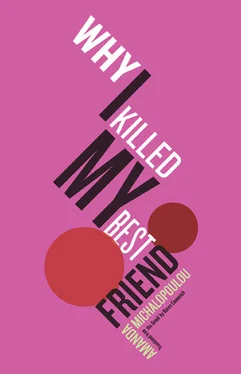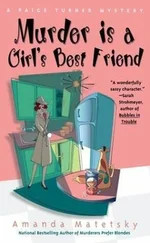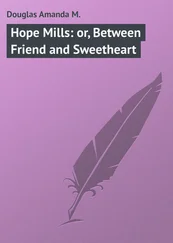Camus’s eyes shoot daggers.
“How dare you? How stupid are you?”
“Let me explain!”
“Explain what? That you brought your little friend here without giving us warning, just because you felt like it? Who are you going to bring along next time, your dad?”
“But you guys can bring your girlfriends, huh? Did anyone ask my permission? And I sit here and put up with your phallocratic bullshit!”
It’s a screaming match; Anna is standing off to one side. For the first time, someone doesn’t want her around and I’m doing my best to convince him.
“On a trial basis,” Camus says. “Just one meeting. Got it?”
Anna gazes at him in awe, but Camus sends us packing.
“Maria, tell me everything, from the beginning.”
We’re walking in the Field of Ares, kicking stones. I keep looking around, paranoid that I’m being followed. I don’t know where to start. The name of our group is Amesi Drasi , Direct Action. Our emblem looks like the anarchy symbol, only the alpha has another line at its base, so that it’s nested inside a delta. Our slogan is “I bleed, therefore I am,” and it comes from a bizarre description of police violence that Camus read somewhere: The policeman’s riot club functions like a magic wand under whose hard caress the banal soul grows vivid and the nameless recover their authenticity — a bestower, this wand, of the lost charisma of the modern self: I bleed, therefore I am .
No theory is airtight. At some point I tell them we need to talk about feminism, and one of them replies: “Thanks, Emma Goldman, but as they say, when the wise man points at the moon, the fool looks at his finger.” They’re all men, around Camus’s age, so they’re apparently the moon, and I’m the finger. The severed finger. Sometimes they bring admirers. I wonder how big those girls’ mouths are. Of course we take precautions: we call one another from phone booths, we never meet in the same place twice, we ignore one another if we pass in the street and refer to one another by pseudonyms. Antonis is Bertrand Russell, since he believes that happiness is to be found in idleness. We call Paris Altol, a cross between Aldus Huxley and Tolstoy. We’ve got our Chomsky, too, otherwise known as Telemachus. Sakis’s pseudonym is Debord, because he considers vandalism a work of art. As for Terzis, Camus is the perfect name for him. He offers us a solid philosophical grounding whenever we get lost in nihilistic conversations: anyone who seeks to destroy everything, he says, ends up self-destructing. So I sleep with him every now and then, to keep from self-destructing.
Camus only allowed me into the group after I’d sufficiently earned his trust. At first I thought I’d entered a den of fools. They wanted to march against the cops carrying huge mirrors, the way the riot police carry bulletproof shields. They were going to have their girlfriends dance topless, too, like maenads.
“Are you guys nuts?” I said. “Are you really that naive? All those sensitive cops are going to be shocked by the sight of their own violence? And you’re going to ask women to act out the fantasies of men in uniform?”
We come from various backgrounds and are always at loggerheads. If we go too far, someone — usually Altol — reminds us that we have a common enemy: the state, the capitalist system. Chomsky always objects that the word “enemy” is too emotionally loaded and we should use the term “opponent” instead, and an argument ensues, until Camus calls us back to order.
“I bleed, therefore I am,” Anna whispers conspiratorially. “It’s kind of contradictory, to say the least, to believe in a slogan like that when you faint at the sight of blood.”
We’re walking arm in arm now, like girls from good families, along the path with the statues in the Field of Ares. Where Aunt Amalia first taught me not to use dirty words.
At her first meeting Anna makes coffee. At the second she tries to forge a common front with Chomsky, but he’s too much of an anarchist for her taste. At the third, she puts her hands on her hips and shouts, “I don’t understand what you’ve all got against the Soviet Union. Show me another truly revolutionary society!”
“There’s no one-size-fits-all solution,” Debord retorts. “What’s true for the Eastern block isn’t necessarily true for the West, and the same goes for Africa. Some people need food, others—”
“Sure, crumbs for the proletariat, art for the intellectuals,” Anna cuts him off. “Who cares about literature and the arts when an apolitical history of art is going to come along after the fact and destroy it all — dadaism, surrealism, even situationsim?”
“We’re with you on that. The issue is to find ways to have art infuse movements of social change with imagination and creativity.”
“Merde, merde, that’s never going to happen! The artists will stay right where they are, shut up in their glass tower.” My guess is she’s not painting much these days.
“Are you by any chance related to Rosa Luxemburg?” Altol teases.
And that’s how she gets her name.
Rosa decides our organization could use some organizing. She says we don’t meet often enough, have no discipline, can’t even make a decent cup of coffee. Her speech is full of annoying words like sacrifice, rage, guilt. She wants us to swear allegiance to a common cause. Common cause? We’re just feathers in the wind.
“No!” Anna says. “You can’t think that way! Revolution has to effect actual political change, otherwise you’re just letting off steam. Why don’t you go to a soccer match if that’s what you’re looking for?”
I have the sneaking suspicion that she chose us, rather than us choosing her.
“It’s over.”
There’s no need for Mom to say more, I understand. Aunt Amalia — whatever was left of Aunt Amalia — is gone. I pound my fist on the table. It used to be where I drew. Now it’s covered in paper: books, photocopies, proclamations, articles about the Zapatistas. With a single motion it’s gone: I sweep the telephone, my pencils, the papers all onto the floor. Suddenly the table is empty and clean. All that’s left is the marks from my X-Acto knife.
“What happened?” Mom shouts. Her voice is coming from the floor, through the tiny holes in the receiver.
“Something fell,” I say, stretching out on the floor next to the phone. Something fell, yes. I can see Amalia now, falling from her balcony in slow motion so as to escape the spies with their burning eyes. I picture her in a long cotton nightgown, though I know she was wearing her black and white dress when they found her. In the movie in my head, she’s a cartoon hero: she bounces back up into the sky as if the sidewalk were a trampoline, bursting into a fit of laughter. The tears won’t come. My emotions just lie there on the floor, amid the piles of paper: overturned, indefinable.
At the funeral, Dad leans down to dust off his shoes with his hand. Mom blows her nose into an embroidered handkerchief. Antigone is wearing huge Jackie Onassis sunglasses. Anna cries for us both. If there’s an afterlife, Stamatis, too, is surely hovering overhead in a velvet armchair with wings, pipe in his mouth. Camus stands a little ways off, next to some other grave. He’s pretending not to know us, and smoking like a chimney.
“He loves you,” Anna says, wiping her eyes.
Merde, there goes another one. She’ll steal him, too.
“Antigone is completely nuts. She’s going on vacation on a yacht.”
“Aren’t you happy she’s happy?”
“Are you serious, merde? Happy with the CEO?” Anna makes a face. Happiness is meaningless if it’s not the kind she approves of. Her mother has fallen in love with an upper-echelon executive of a multinational corporation. We see them in magazines hobnobbing with members of the administration. Antigone is always looking away—“out of guilt,” Anna claims. The executive has a baby face and white hair and is always wearing a tie. You’d think they grabbed him right out of grade school and threw him into the thick of it. I’ve never met him, but he’s left his mark everywhere. The bookshelves in the living room, which were always in utter disarray, are somewhat more presentable now. A woman from northern Epirus comes and cleans the house in Plaka twice a week. The lithograph by Tasos has given way to a painting by Kostas Tsoklis. Antigone travels with her new man to Mexico, Buenos Aires, Morocco. They come home laden with rugs, copper pots, maté gourds.
Читать дальше












